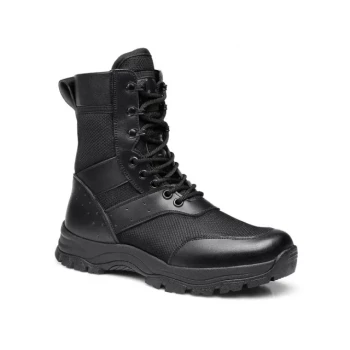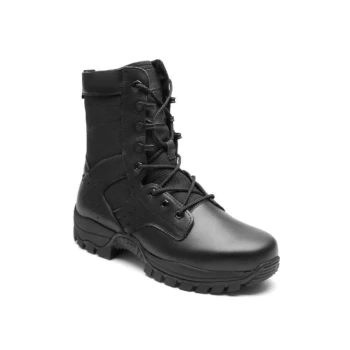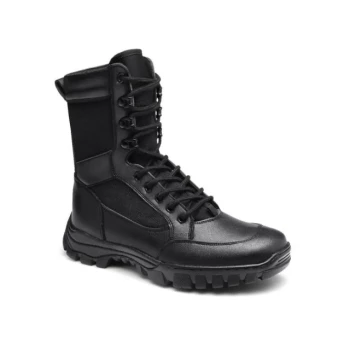Chainsaw (CS) protection in safety footwear is mandatory for any ground-level task involving the operation of a chainsaw. This requirement stems from the unique and severe laceration hazard a moving chain presents, which standard steel-toe or composite-toe boots are not designed to mitigate.
The decision to require chainsaw boots is not based on the frequency of use, but on the nature of the risk. If a running chainsaw can potentially make contact with an operator's foot, specialized protective footwear is the only adequate safeguard.
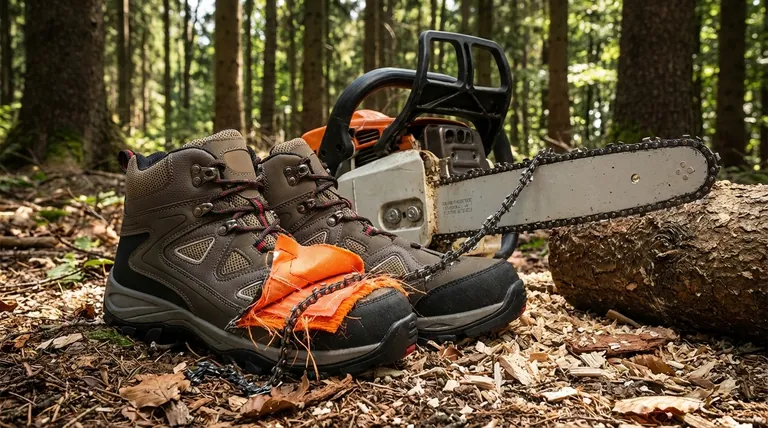
Why Standard Safety Boots Fall Short
Many assume that a protective toe cap is sufficient for all workplace foot hazards. However, a running chainsaw presents a dynamic cutting threat, not a simple impact or compression risk.
The Unique Laceration Hazard
A standard safety boot is designed to protect against a falling object or a crushing force. It offers virtually no defense against the hundreds of cutting teeth on a chain moving at over 50 miles per hour.
The chain will cut through leather, rubber, and even the material surrounding a steel toe in an instant, leading to catastrophic injury.
How Chainsaw Protection Works
Chainsaw-protective boots contain multiple layers of specialized cut-retardant fabric, often made from materials like Kevlar, nylon, or polyester.
When a moving chain makes contact with the boot, its teeth grab these fibers. The long, tough fibers are instantly pulled out and drawn into the chainsaw’s drive sprocket, clogging the mechanism and stopping the chain's motion, often in a fraction of a second.
Identifying When CS Boots are Required
The guiding principle is based on the task and the operator's position. A formal risk assessment is always the definitive guide, but clear industry standards exist.
Ground-Level Operations
This is the most common scenario mandating CS boots. It includes any work where an operator is standing on the ground while using a saw.
Industries such as forestry, logging, landscaping, and arboriculture (for ground crew) have clear requirements for this type of PPE.
Emergency Services and Land Clearing
Firefighters, utility workers, and disaster response teams who clear fallen trees and debris with chainsaws must also wear appropriate CS-rated footwear.
The Exception: Working at Height
An important exception often exists for arborists or other professionals working at height (e.g., climbing a tree).
In this context, the bulk and stiffness of CS boots can sometimes create a greater risk by reducing climbing mobility and feel. Regulations like OSHA may permit experienced climbers to use standard heavy-duty boots, as the nature of the cuts and body positioning reduces the specific risk to the feet.
Understanding the Trade-offs and Standards
While essential, chainsaw boots have specific characteristics that users must understand. Knowing how to identify a compliant boot is equally critical.
Reading the Certification Label
Properly rated chainsaw boots will have specific markings to indicate they meet safety standards.
- ASTM F1818: This is the primary standard from the American Society for Testing and Materials. Look for this designation on the boot's label.
- EN ISO 17249: This is the European standard. Boots are rated in Classes (1, 2, or 3), which correspond to the chain speed they can resist.
- The "Green Tree" Tag: In the US, look for a tag showing a fir tree inside a triangle, which signifies the boot meets ASTM standards for leg protection.
Common Downsides
Chainsaw boots are a highly specialized tool, and their protective features come with trade-offs. They are typically heavier, stiffer, and less breathable than standard work boots due to the multiple layers of protective fabric. This can lead to increased fatigue and discomfort during long periods of wear. They also represent a significantly higher cost.
Making the Right Choice for Your Task
Selecting the correct footwear is a critical safety decision that must be based on the specific task being performed, not on convenience or cost.
- If your primary focus is ground-based chainsaw work: CS-rated boots compliant with ASTM F1818 or EN ISO 17249 are non-negotiable.
- If your primary focus is aerial work as a climber: Carefully consult your organization's safety policies and local regulations, as sturdy, non-CS boots may be the safer choice for mobility.
- If your primary focus is incidental or emergency use: A formal risk assessment must dictate the requirement, but the safest policy is to use CS boots for any planned chainsaw operation.
Ultimately, using task-specific PPE is the hallmark of a professional who prioritizes safety above all else.
Summary Table:
| Scenario | CS Boots Required? | Key Rationale |
|---|---|---|
| Ground-Level Chainsaw Operation (e.g., Forestry, Logging) | Yes, Mandatory | Protects against unique, severe laceration hazard from a moving chain. |
| Aerial/Climbing Arborist Work | Often No (Consult Regulations) | Bulk/stiffness may pose a greater mobility risk than the foot-specific laceration risk. |
| Emergency/Incidental Use (e.g., Land Clearing) | Yes (Strongly Recommended) | A formal risk assessment is required, but CS boots provide the safest option. |
Ensure Your Team's Safety with the Right Protective Footwear
As a large-scale manufacturer, 3515 produces a comprehensive range of certified safety footwear for distributors, brand owners, and bulk clients. Our production capabilities include specialized chainsaw-protective (CS) boots designed to meet rigorous standards like ASTM F1818 and EN ISO 17249.
We help businesses in forestry, logging, landscaping, and emergency services equip their teams with task-specific PPE that prioritizes safety without compromising on durability.
Protect your workforce with reliable, compliant footwear. Contact our experts today to discuss your specific needs and volume requirements.
Visual Guide
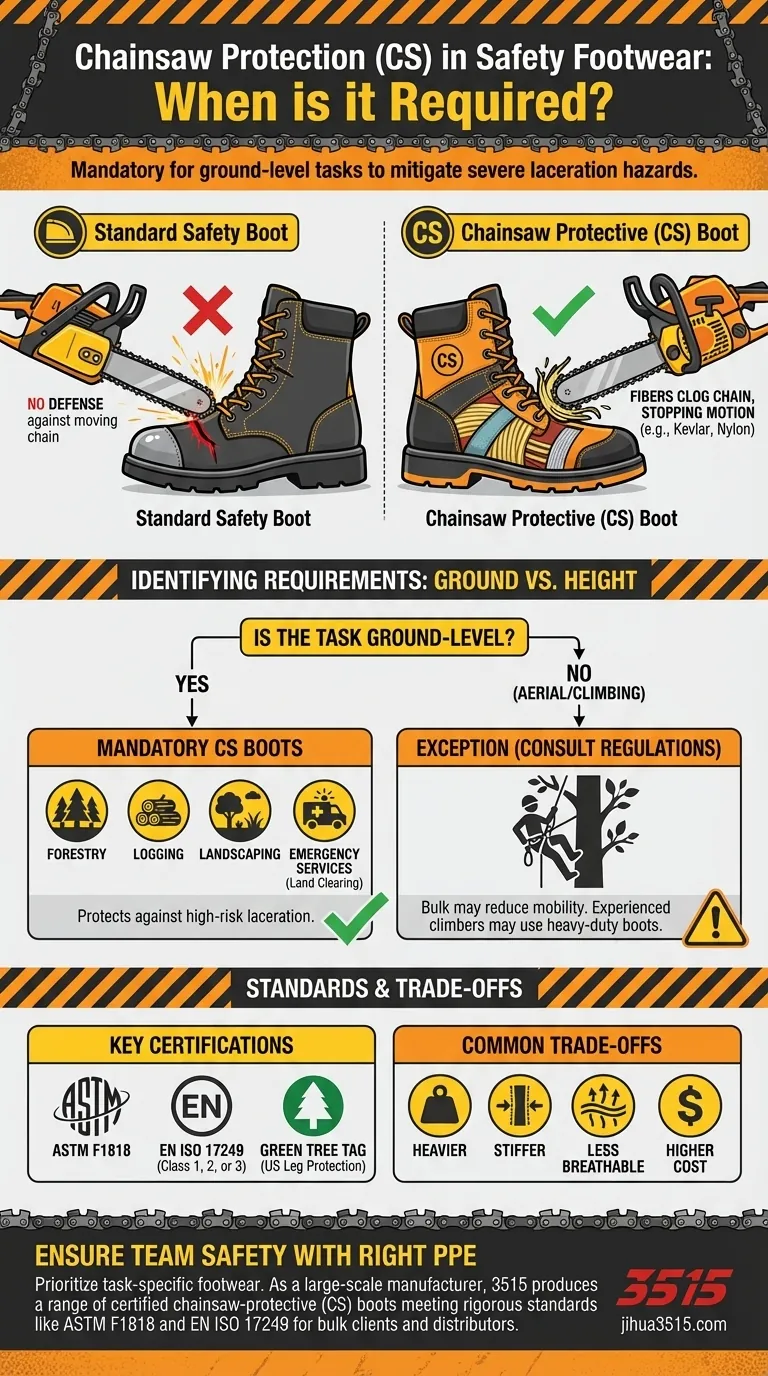
Related Products
- Safety Footwear Wholesale Manufacturer for Custom OEM/ODM Production
- Wholesale Safety Footwear Manufacturer for Bulk & Custom OEM Orders
- Premium Wholesale Waterproof Safety Boots High Performance Protection for Industrial Markets
- Custom Wholesale Leather Safety Boots Direct Factory Manufacturing
- Premium Grain Leather Safety Boots for Bulk Supply
People Also Ask
- What are the differences between steel toe, composite toe, and alloy toe Wellington boots? Choose the Right Safety Toe for Your Job
- What cultural and environmental considerations are tied to wearing shoes indoors? Balance Hygiene, Tradition, and Foot Health
- How long can you wear safety boots? The Lifespan is Determined by Wear, Not Time
- Do snake bite boots work? Your Ultimate Guide to Effective Snake Bite Protection
- What do heavy duty boots do? Protect Your Feet in Demanding Work Environments












